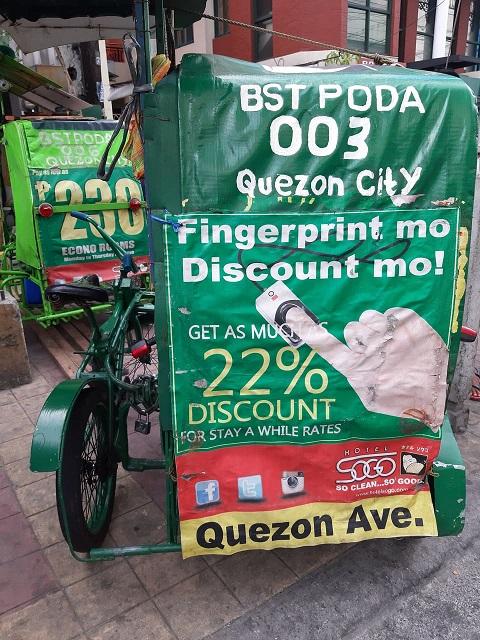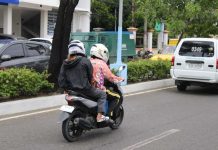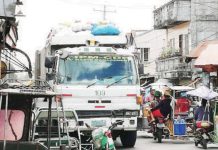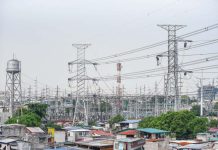
MANILA – Tricycles. They come in various designs and shapes and height and width. One tricycle can seat five but when public transport is in short supply, it can accommodate more as long as there’s a space for a foot and a hand can grab a part.
The trip can be long or short and the fare can sometimes involve guesswork and surprise. Fists have been known to fly when the latter does not fit the former.
In the country’s over 42,000 barangays, there is always one or more Tricycle Operators and Drivers Association, or TODA.
TODAs always come with the name of the barangay as a prefix. Thus, Barangay Labuyo has LABTODA and Barangay Encarnacion has ENCANTODA.
Because of their presence in almost every barangay, TODAs are an effective tool in promoting a product or a person running for public office. Small as it is, the tricycle has a lot of areas that can accommodate promotional materials. Stickers can be placed inside each unit, visible to its riders. A small tarp with an ad can be attached at the back which also serves as a backrider’s shield against the sun.
And the most brilliant of all – one can sponsor the shirts or vests of TODA drivers for a stronger personal presence.
“May mga politiko na nagbibigay mostly T-shirts or vests na pang-uniform ng driver,” confirmed Marvin Morales, chairman of Barangay Escopa and president of the local tricycle association called Greater Project 4 TODA or GP4TODA. He owns a tricycle and has been TODA president for three years now.
Morales said some politicians approach local officials like him for advertising support using the community’s TODA. These requests are given due course and approved especially if the TODA received support from the politician.
“Hindi naman maiiwasan ang mga ganoong ads lalo na’t kung si barangay ang nilapitan ng politiko at si barangay naman ang kakausap sa TODA. Hindi tatanggi ang TODA kapag ganoon,” he said.
Malou Tiquia, campaign strategist and co-founder of lobbying and campaign firm Publicus, explained that TODAs serve as mobile billboards.
“They could be source of votes since TODAs are organized and have terminals,” Tiquia said. “They can increase awareness of candidates and can be source of organized votes.” But like all platforms, the efficacy of TODAs depend on the ground strategy adopted by the campaign.
A veteran campaign strategist who is now retired – and who asked not to be named to avoid being roused out of retirement – recalled that before the millennia up to 2004, he used TODAs in his campaigns both for products and people.
“We used the usual stickers with candidates or advocacy taglines, also tarps with messages targeting the people in the area where these three-wheeled, smoke-belching transporters ply,” he said. Tarps were customized to fit the sizes of tricycles that differed from province to province, he added. The tricycles, he said, were effective since they are mobile and get to a community’s “inner parts unknown.”
Tricycle drivers were paid P500 to P800 a month. When the tricycle owners discovered the scheme, they took over negotiations for the rates and took the money home.
“There was a time I printed 2 million stickers just for tricycles and jeepneys,” he said.
The approach was a hit that the veteran campaign strategist came up with a novel idea. He had 100,000 cassette tapes (Google it up, millennials) produced with some 20 top hits at that time. The cassette tapes were given to tricycle and jeepney drivers who had players. Of course there’s no free lunch: “In between the songs was the campaign jingle of the client,” he said.
Are TODAs an effective campaign tool? “I had a high batting average,” said the retired campaign strategist. “Sadly, I do not have data to determine which of the efforts contributed, and by how much, to the campaign,” he said.
TODAs are vote rich, too. A tricycle can mean votes from three families: the owner, and the morning and evening shift drivers.
The Philippine Statistics Authority reports that as of 2016, there are 270,759 tricycles in the country. However, that is not an accurate count as there are numerous “colorum” or unregistered tricycles plying the route of every TODA. In Quezon City alone, the local government used a payloader to crush hundreds of sidecars used by colorum tricycle drivers in 2017.
But illegal or not, the tricycle is becoming a tool to increase public awareness of products and people. In Kamuning, some tricycles are announcing a newly-opened meat shop. In the Scout area, some tricycles are promoting a motel’s biometrics system to get as much as 22 percent discount in room rates. In the past, Quezon City’s TODAs carried posters of politicians running for councilor and other higher offices.
GMA Public Affairs has taken note of the role of TODAs in society. Its pre-election drama series “TODA One I Love,” which airs nightly at 9:30 p.m., focuses on the TODA. (GMA News)







